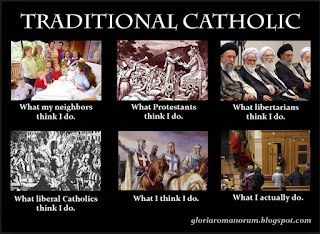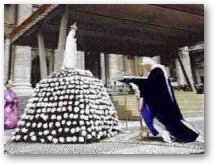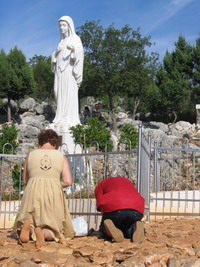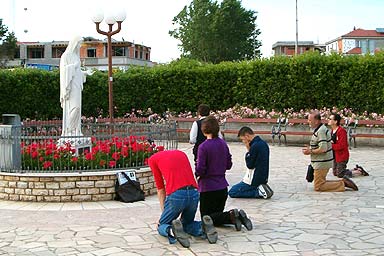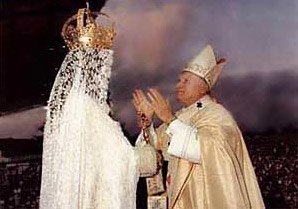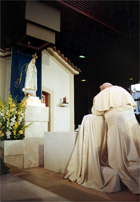Cathmom5's
introduction: The following post was used in the Catholic Debate Forum
discussion on whether or not Catholics are allowed to disagree with the
opinions or non-infallible writings of Catholic magisterium. Mr. Conte’s post on When May a Catholic Disagree with Pope Francis? was
used to dispute an atheist's argument that if a Catholic work has an
imprimatur by a member of the Papal Biblical Commission, a Catholic had
no right to disagree with it. As many members tried to point out, an
imprimatur simply means "it may be printed." It basically means the
bishop gave permission to the author to go ahead and print the project.
A Nihil Obstat says that there is nothing offensive or nothing to
offend a Catholic in the book. Neither is a stamp proclaiming the work
as official Catholic teaching, but nothing seems to convince the
atheist of the error of his interpretation of Catholic phrases,
documents, and doctrine. He believes he knows everything there is to
know about what Catholics believe, and no one can tell him otherwise.
The point several people have tried to make is that Catholics are free
to disagree with a commentary; a commentary is not compulsory belief.
All that aside, even if were "official" Catholic Teaching, I would not
agree with his interpretation of what it said in the JBC or how he tried
to apply it to an issue that had nothing to do with the commentary
entry.
Anyway, I thought this article by Mr. Ron Conte was an excellent explanation of how and when a Catholic may disagree with the Catholic Magisterium (Pope Francis specifically, but it can and does apply to the magisterium in general). I will make some comments to Mr. Conte's post just for purposes of pointing out some anti-Catholic people (Protestant, atheist, what have you) who like to claim that Catholics are mindless drones, or at the very least not allowed to think for themselves.
Anyway, I thought this article by Mr. Ron Conte was an excellent explanation of how and when a Catholic may disagree with the Catholic Magisterium (Pope Francis specifically, but it can and does apply to the magisterium in general). I will make some comments to Mr. Conte's post just for purposes of pointing out some anti-Catholic people (Protestant, atheist, what have you) who like to claim that Catholics are mindless drones, or at the very least not allowed to think for themselves.
When May a Catholic Disagree with Pope Francis?
Posted on 11 November 2014 by Ron Conte
One thing that Catholics are not allowed to disagree on is the Pope. The pope is elected by the College of Cardinals through the guidance of the Holy Spirit. The process has been formalized and streamlined over the centuries but the ceremony does not take away the work of the Holy Spirit. In other words, Catholics are not allowed to disagree with the Holy Spirit. As Mr. Conte said, the Catholic who does not recognize the current, validly elected pope is in schism (no longer a Catholic). Unfortunately, there are many of them out there now--claiming to be Catholic but claim there is no valid pope. They are wrong and no longer Catholic.Pope Francis is a valid Pope. He is currently the only Roman Pontiff of the Catholic Church. Pope Benedict XVI validly resigned, and so he is no longer the Pope; that is why he is called “Pope emeritus”. Any Catholic who rejects Pope Francis as the valid and sole current Pope of the one true Church is in a state of formal schism, is automatically excommunicated, and may not receive any of the Sacraments (except Confession, once he is repentant). If you reject the Pope, you have separated yourself from formal communion with the Catholic Church.
So here Mr. Conte wants to make it clear that not all of what the pope says is binding on all Catholics. Not everything he says is infallible. In other words, we are allowed to use our own brain. The following are conditions under which we may disagree.For Catholics who accept Pope Francis as the valid Roman Pontiff, some disagreement is possible without heresy, schism, or other grave sin.
1. Personal Opinion
When Pope Francis expresses his personal opinion on a matter of faith or morals (or any other topic), and given that the Magisterium has no definitive teaching on the subject, the faithful Catholic is free to disagree.
“It goes without saying that this book is in no way an exercise of the magisterium, but is solely an expression of my personal search ‘for the face of the Lord’ (cf. Ps 27:8). Everyone is free, then, to contradict me. I would only ask my readers for that initial goodwill without which there can be no understanding.” [1]
Here Pope Benedict XVI gives us a good example to follow concerning the expression of theological opinions by the Bishops and the Pope. Such expressions, no matter how emphatically they may be phrased, are not an exercise of the Magisterium, and so are not binding on the faithful. All are free to disagree with the Pope in any personal opinion that he expresses: about Jesus, about matters of faith and morals, and certainly on other matters.
The pope's personal opinions, personal devotions, prayers, etc. are his own. Of course, I'd think that his opinion pulls much more weight than mine. Pope St. John Paul II's opinion on the death penalty [*added 22 Jun 17--See #5, third paragraph from his St. Louis Homily] made me look at it differently, and I eventually changed my opinions in line with his. Eventually, he included his teaching on the subject in his encyclical Evangelium Vitae (the Gospel of Life) in 1995. This encyclical lends even more weight to his teaching. See below under prudential judgment.Caveat: In all likelihood, the opinion of the Pope on any matter pertaining to faith or morals is better than your opinion. The mere opinion of the Pope is fallible, but so are all your opinions.
2. Prudential Judgment
When Pope Francis issues a judgment of the prudential order, under his authority as Pope, but as a judgment not a teaching, the faithful Catholic is free to disagree.
Cardinal Joseph Ratzinger: “Not all moral issues have the same moral weight as abortion and euthanasia. For example, if a Catholic were to be at odds with the Holy Father on the application of capital punishment or on the decision to wage war, he would not for that reason be considered unworthy to present himself to receive Holy Communion. While the Church exhorts civil authorities to seek peace, not war, and to exercise discretion and mercy in imposing punishment on criminals, it may still be permissible to take up arms to repel an aggressor or to have recourse to capital punishment. There may be a legitimate diversity of opinion even among Catholics about waging war and applying the death penalty, but not however with regard to abortion and euthanasia.” [2]
The changes in the Mass since Vatican II have been the basis of much disgruntlement among "radical traditionalists" sometimes called "rad-trads". These people refuse to go to Mass when the novus ordo (new order) Mass is said. They seek out traditional Latin Mass for the most part. The Latin Mass, per se is certainly not a bad thing, but neither is the Novus ordo. Since the radical changes to the new Mass in the 70's, the American Bishops have been working on tweaking the Mass, making it closer to the Latin Mass. The updates have been good. The point is that no practicing Catholic is allowed to forego Mass because there is not a Mass nearby that they believe is the right one. Even if you believe that everyone should attend a Latin Mass, you cannot skip Mass while on vacation just because you can't find a Latin Mass.Caveat: An official decision of the Pope under his temporal authority (the type of Church authority that exercises prudential judgment) may still be binding on you as a Catholic. So, for example, if the Pope changes the form of the Mass, you are free to think that the changes are imprudent, but you are not free to reject the Mass on that basis. Or if the Pope changes the rules for reception of Communion, you are free to argue that the changes are imprudent, but you are not free to reject the Mass or the Pope on that basis.
3. Non-infallible Teachings
Each and every teaching of the Magisterium falls into one of two categories: infallible or non-infallible. It is a common misunderstanding to think that all teachings of the Magisterium are entirely without error.
The non-infallible teachings are reliable and have only a limited possibility of error, but they are NOT infallible. The errors possible in non-infallible teachings never reach to the extent of leading the faithful away from the path of salvation. But non-infallible teachings are non-irreformable. They are subject to a limited possibility of correction, improvement, and change.
Here we see a very specific statement on when we have freedom of thought! from Pope St. John Paul II. "There exist in the Church a lawful freedom of inquiry and thought and also general noms of licit dissent." There is no doubt we are allowed to think for ourselves.“There exist in the Church a lawful freedom of inquiry and of thought and also general norms of licit dissent.” [4]
Non-infallible teachings are subject to a limited possibility of error and reform; therefore, they do not require the full assent of faith, but a lesser type of assent called the “religious submission of mind and will” [5]. What this means is that you are generally required to believe the non-infallible teachings of the Church. But there is some room for faithful dissent, called “licit theological dissent” [4]. To whatever extent a teaching might err, the faithful are free to disagree. God who is Truth never requires assent to false or erroneous ideas.
The non-infallible teachings of the Magisterium are full of truth. The number, type, and extent of the possible errors is quite limited.
An example of an error in a non-infallible teaching is found in the first edition of the Catechism of the Catholic Church, in the definition of lying, which erroneously stated that an assertion is only a lie if the person (to whom you are speaking) has a right to the truth. That claim was removed from the second edition.
Pay attention to this caveat. Well stated Mr. Conte.Caveat: The basis for the disagreement must be Sacred Tradition, Sacred Scripture, or teachings of the Magisterium of greater authority. Most Catholics who reject a non-infallible teaching of the Magisterium have no legitimate basis for that rejection.
4. Infallible Teachings
The infallible teachings are free from all possibility of error due to the work of the Holy Spirit. The infallible teachings require your full assent with the virtue of faith; obstinate disagreement is the grave sin of heresy.
The infallible Magisterium is exercised in any of three ways:
a. Papal Infallibility
b. Conciliar Infallibility
c. the ordinary and universal Magisterium
To reject an infallible teaching of the Magisterium is material heresy. To do so knowingly and deliberately is the grave sin of formal heresy, which includes the penalty of automatic excommunication. If Pope Francis or any other valid Pope teaches something under any type of infallibility, you are required to give that teaching the full assent of faith. Otherwise, you commit heresy and formally separate yourself from the one true Church.
Caveat: Do not be fooled by those blind guides who claim that the Pope can commit heresy himself, and thereby lose his authority. Doctor of the Church Saint Robert Bellarmine held it to be “probable” that the Pope could never commit heresy personally, nor teach heresy in any way. He also held it to be “certain” that the Pope could never define a heresy as a teaching to be believed by the whole Church.
If all of this is true of the pope, so much more so does it apply to priests, bishops, archbishops, and Cardinals. We are free to disagree on opinion.The foolish today claim that IF a Pope teaches heresy in a way that would seem to fall under infallibility, the teaching is nullified because the Pope fell into heresy. To the contrary, Saint Bellarmine believed that a Pope could NEVER teach heresy in a way that would seem to fall under infallibility.
by Ronald L. Conte Jr. Roman Catholic theologian and
translator of the Catholic Public Domain Version of the Bible.
Endnotes:
[1] Joseph Ratzinger, Benedict XVI, Jesus of Nazareth, p. xxiv.
[2] Cardinal Joseph Ratzinger, Worthiness to Receive Holy Communion, General Principles (sent by Cardinal Ratzinger to Cardinal McCarrick, Archbishop of Washington, D.C., and made public in July, 2004), n. 3; http://www.priestsforlife.org/magisterium/bishops/04-07ratzingerommunion.htm
[3] Address of Pope John Paul II to the Bishops from the United States on their ‘Ad Limina’ visit, 15 October 1988, n. 5.
[4] National Conference of Catholic Bishops (predecessor to the USCCB), Human Life in Our Day, “Norms of Licit Theological Dissent” n. 49 to 54; http://www.priestsforlife.org/magisterium/bishops/68-11-15humanlifeinourdaynccb.htm
[5] Second Vatican Council, Lumen Gentium, n. 25.
I
received permission by email on 6/26/2016 to reprint Mr. Conte’s post.
Recently
the pope made comments about marriage and co-habitation. Some of his
comments were misunderstood, but some of them were outright wrong. Here
is a discussion about the pope's comments on The World Over, a news
program on EWTN:
https://www.youtube.com/watch?v=uLFyB-DxzmQ
Just in case it resets, the discussion starts about 27:51. Both guests Robert Royal, and Fr. Gerald Murray, disagree strongly with the pope's words. Guess what, they are free to do so, and under the category of "non-infallible teachings we see that they do have legitimate reasons to disagree with him. The pope was not making an official proclamation nor was he teaching on faith and morals from the chair of Peter. We are allowed to disagree with the pope when his teaching seems to conflict tradition Catholic teaching. We have had unorthodox popes in the past, and the magesterium has disagreed with a pope or two in the past, but the Church's dogmas and doctrines have never been changed in any material way by any reigning pope.
Just in case it resets, the discussion starts about 27:51. Both guests Robert Royal, and Fr. Gerald Murray, disagree strongly with the pope's words. Guess what, they are free to do so, and under the category of "non-infallible teachings we see that they do have legitimate reasons to disagree with him. The pope was not making an official proclamation nor was he teaching on faith and morals from the chair of Peter. We are allowed to disagree with the pope when his teaching seems to conflict tradition Catholic teaching. We have had unorthodox popes in the past, and the magesterium has disagreed with a pope or two in the past, but the Church's dogmas and doctrines have never been changed in any material way by any reigning pope.






